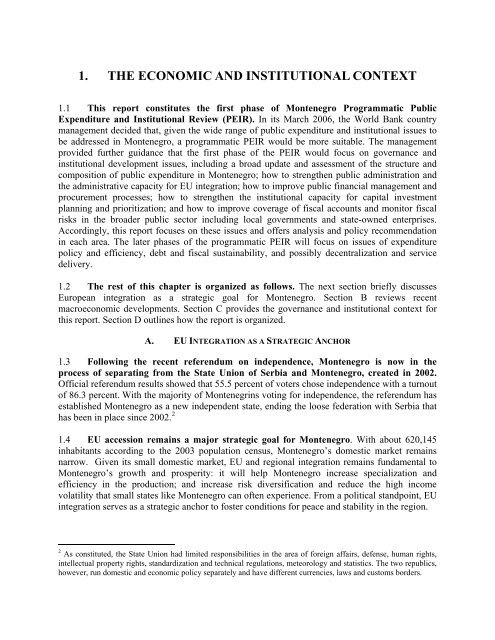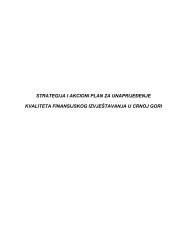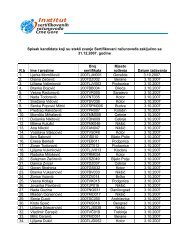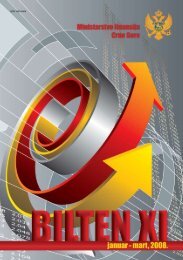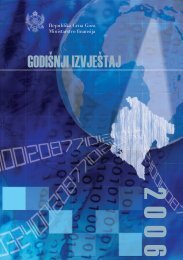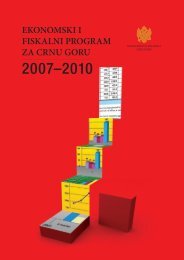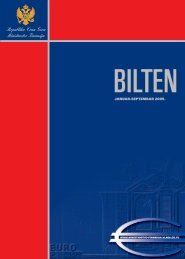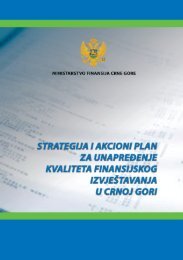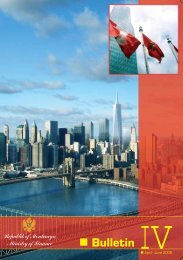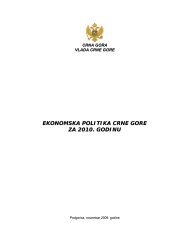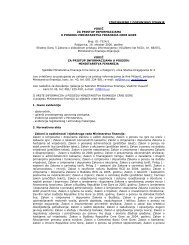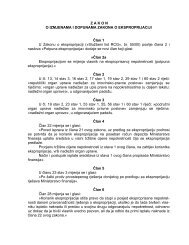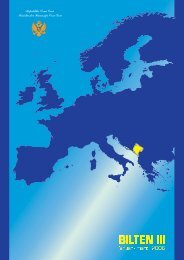Republic of Montenegro: Public Expenditure and ... - Vlada Crne Gore
Republic of Montenegro: Public Expenditure and ... - Vlada Crne Gore
Republic of Montenegro: Public Expenditure and ... - Vlada Crne Gore
You also want an ePaper? Increase the reach of your titles
YUMPU automatically turns print PDFs into web optimized ePapers that Google loves.
1. THE ECONOMIC AND INSTITUTIONAL CONTEXT<br />
1.1 This report constitutes the first phase <strong>of</strong> <strong>Montenegro</strong> Programmatic <strong>Public</strong><br />
<strong>Expenditure</strong> <strong>and</strong> Institutional Review (PEIR). In its March 2006, the World Bank country<br />
management decided that, given the wide range <strong>of</strong> public expenditure <strong>and</strong> institutional issues to<br />
be addressed in <strong>Montenegro</strong>, a programmatic PEIR would be more suitable. The management<br />
provided further guidance that the first phase <strong>of</strong> the PEIR would focus on governance <strong>and</strong><br />
institutional development issues, including a broad update <strong>and</strong> assessment <strong>of</strong> the structure <strong>and</strong><br />
composition <strong>of</strong> public expenditure in <strong>Montenegro</strong>; how to strengthen public administration <strong>and</strong><br />
the administrative capacity for EU integration; how to improve public financial management <strong>and</strong><br />
procurement processes; how to strengthen the institutional capacity for capital investment<br />
planning <strong>and</strong> prioritization; <strong>and</strong> how to improve coverage <strong>of</strong> fiscal accounts <strong>and</strong> monitor fiscal<br />
risks in the broader public sector including local governments <strong>and</strong> state-owned enterprises.<br />
Accordingly, this report focuses on these issues <strong>and</strong> <strong>of</strong>fers analysis <strong>and</strong> policy recommendation<br />
in each area. The later phases <strong>of</strong> the programmatic PEIR will focus on issues <strong>of</strong> expenditure<br />
policy <strong>and</strong> efficiency, debt <strong>and</strong> fiscal sustainability, <strong>and</strong> possibly decentralization <strong>and</strong> service<br />
delivery.<br />
1.2 The rest <strong>of</strong> this chapter is organized as follows. The next section briefly discusses<br />
European integration as a strategic goal for <strong>Montenegro</strong>. Section B reviews recent<br />
macroeconomic developments. Section C provides the governance <strong>and</strong> institutional context for<br />
this report. Section D outlines how the report is organized.<br />
A. EU INTEGRATION AS A STRATEGIC ANCHOR<br />
1.3 Following the recent referendum on independence, <strong>Montenegro</strong> is now in the<br />
process <strong>of</strong> separating from the State Union <strong>of</strong> Serbia <strong>and</strong> <strong>Montenegro</strong>, created in 2002.<br />
Official referendum results showed that 55.5 percent <strong>of</strong> voters chose independence with a turnout<br />
<strong>of</strong> 86.3 percent. With the majority <strong>of</strong> Montenegrins voting for independence, the referendum has<br />
established <strong>Montenegro</strong> as a new independent state, ending the loose federation with Serbia that<br />
has been in place since 2002. 2<br />
1.4 EU accession remains a major strategic goal for <strong>Montenegro</strong>. With about 620,145<br />
inhabitants according to the 2003 population census, <strong>Montenegro</strong>’s domestic market remains<br />
narrow. Given its small domestic market, EU <strong>and</strong> regional integration remains fundamental to<br />
<strong>Montenegro</strong>’s growth <strong>and</strong> prosperity: it will help <strong>Montenegro</strong> increase specialization <strong>and</strong><br />
efficiency in the production; <strong>and</strong> increase risk diversification <strong>and</strong> reduce the high income<br />
volatility that small states like <strong>Montenegro</strong> can <strong>of</strong>ten experience. From a political st<strong>and</strong>point, EU<br />
integration serves as a strategic anchor to foster conditions for peace <strong>and</strong> stability in the region.<br />
2 As constituted, the State Union had limited responsibilities in the area <strong>of</strong> foreign affairs, defense, human rights,<br />
intellectual property rights, st<strong>and</strong>ardization <strong>and</strong> technical regulations, meteorology <strong>and</strong> statistics. The two republics,<br />
however, run domestic <strong>and</strong> economic policy separately <strong>and</strong> have different currencies, laws <strong>and</strong> customs borders.


